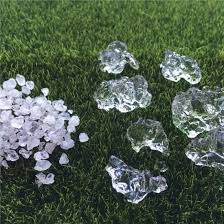Agriculture-grade super absorbent polymer (Super Absorbent Polymer) has gained attention for its potential to help plants retain water, reducing watering frequency and appearing as a convenient solution. However, it’s crucial to distinguish between industrial-grade Super Absorbent Polymer like sodium polyacrylate, which can be harmful to plants, and agriculture-grade Super Absorbent Polymer, specifically potassium polyacrylate, which is beneficial and environmentally friendly.

Potassium polyacrylate, an agriculture-grade Super Absorbent Polymer, plays a key role in water retention without causing pollution. Numerous studies have demonstrated its ability to increase crop yields, especially in arid regions.
Unlike sodium polyacrylate, which can lead to soil hardening and lacks benefits for plants due to its sodium content, potassium polyacrylate contains potassium, a nutrient beneficial for plant growth and soil structure enhancement.
Полиакрилат натрия, on the other hand, finds extensive use in industrial products such as diapers, sanitary napkins, concrete protection materials, waterproof tape, and ointments.
For further information about полиакрилат калия, click here.
This expanded version provides a clearer explanation of the differences between sodium and potassium polyacrylate, emphasizing the importance of using the correct type of Super Absorbent Polymer in agricultural applications for optimal plant health and growth.

